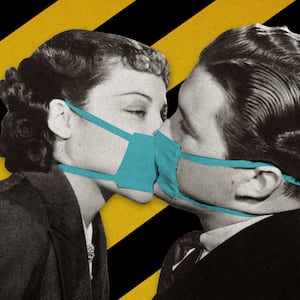Before COVID-19 left him working from home, Kevin McDermott had a “predictable” morning routine. The structural engineer, who lives in Bucks County, Pennsylvania, with his wife (The Daily Beast’s morning editor Erin Friar), would catch the train every morning, sitting in almost the same seat day after day.
“When you’re doing it, it’s the grind, and you grumble about it,” McDermott said. “When it’s taken away, you realize how much you rely on it. It’s a safety, a security blanket.”
It’s not something McDermott wants to give up. Since he’s telecommuting, he has nowhere to go. Still, Monday through Friday, he gets up, makes coffee, steps outside to get inside his Honda Civic, and spends 30 minutes listening to his favorite broadcast, NPR’s Fresh Air.
“It’s not because [my car] is fine German engineering,” McDermott said. “This is about as mundane a commuter car as I can get. I’m there as long as my coffee lasts. My body is attuned to it. I’m faking my body out, like nothing has changed.”
He’s not alone. As the world adjusts to this so-called new normal, we’re trying to pack as much of our old routine in as possible.
A good friend of mine goes on about one app date a day—virtual meetups, of course—to keep some semblance of a regular social calendar.
“I know it’s weird, but the swipe life was a part of my every day” she said, “Even though I’m not going to see anyone IRL, it’s nice to maintain it for now.” If she likes someone, she’ll FaceTime.
Her two roommates still do their nails every week, and put on makeup on the weekends, even if they’re only “going out” to the roof to shoot TikToks. They can only stand wearing pajamas and sweats for so long.
Jon Levy, a New Yorker currently hunkered down at his parents’ home in Philadelphia, is going through his tape collection, re-discovering albums like Culture Club’s Color By Numbers.
“Gen X comfort food,” he calls it. “I feel like the nostalgia kind of helps.”
Sometimes, it isn’t that tough to replicate a life pre-isolation, especially for those whose jobs are spent in front of monitors. As our senior entertainment reporter Kevin Fallon joked to me over Slack, “To feel normal and remind myself of what it was like to go into the office, I turned on my computer, opened a Google document, put on my headphones, and didn’t speak to another human for 9 hours.”
The Daily Beast asked readers over social media: “What are you doing to stay normal in these very not-normal times?” Plenty responded with popular stuck-at-home activities: baking, gardening, four showers a day. This makes sense to Dr. Sara Denning, a psychologist who uses applied neuroscience to treat anxiety in her New York practice.
“Look at where you are physically: a place that means home,” Dr. Denning said. “[You might think] ‘I’m at home, I always wanted to bake, or upholster this chair. I’m going to be here the next 3 weeks.’ There is a lot of innovation and domestic creativity right now. The next question is: How do you keep that going [post-isolation]?”
Suzanne Mayek, 59, lives in Milwaukee, Wisconsin. Both she and her 7-year-old granddaughter, who has a neurological disorder, are high-risk patients. They’re hunkering down and staying inside as much as possible. She lives across the street from a church that’s usually so packed on Sundays that it’s hard for them to leave the driveway. But now the church is closed, so they take walks around its adjacent cemetery. It’s a way to add some structure to their day.
“It seems morbid, but it’s really nice,” Mayek said. “There are a lot of beautiful trees and flowers. I have my granddaughter go in there and try to collect certain colored rocks, or pine cones, or identify flowers. We’re big into gardening, but right now, there’s not a lot of flowers in the Midwest. But we try not to venture too far out of our neighborhood. We don’t want to run into people who don’t believe [coronavirus] is an issue.”
One Twitter user said that he is cooped up with his father, who turned 98 over the weekend. They usually watch baseball together, but since the MLB has suspended games, they watch reruns of old ones. “It’s all the same to him, as long as I’m there,” the man wrote.
Dr. Denning explained that it makes sense for humans to maintain old habits even as their worlds have starkly changed. “If you’re supposed to be in your car [during the time of your normal commute], then go along with it,” she said. “You will be calmer and happier throughout the day if you keep your behavioral patterns similar.”
It’s why we look forward to Zoom happy hours, even if they’re not the same as the real deal. “You’re finding a way to be you, no matter the context you’re in,” Dr. Denning said. “There’s this beautiful long tradition called self-continuity. Prisoners of war have talked about this. If you can somehow continue to be yourself, it is part of survivor mode.”
Dr. Denning doesn’t refer to our coronavirus lifestyles as a “new normal.” For her, it’s a “temporary normal.” Car-sitters and virtual daters will eventually go back to commuting to work or meeting someone at a bar. Until then, they will just have to pretend.
As McDermott put it, “Even when you go on vacation, by the end of it, you almost look forward to going back to your routine.”






